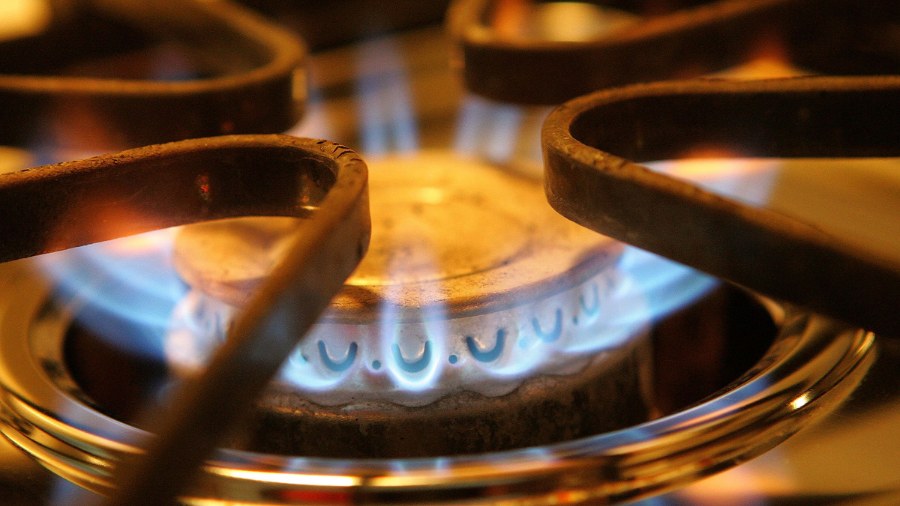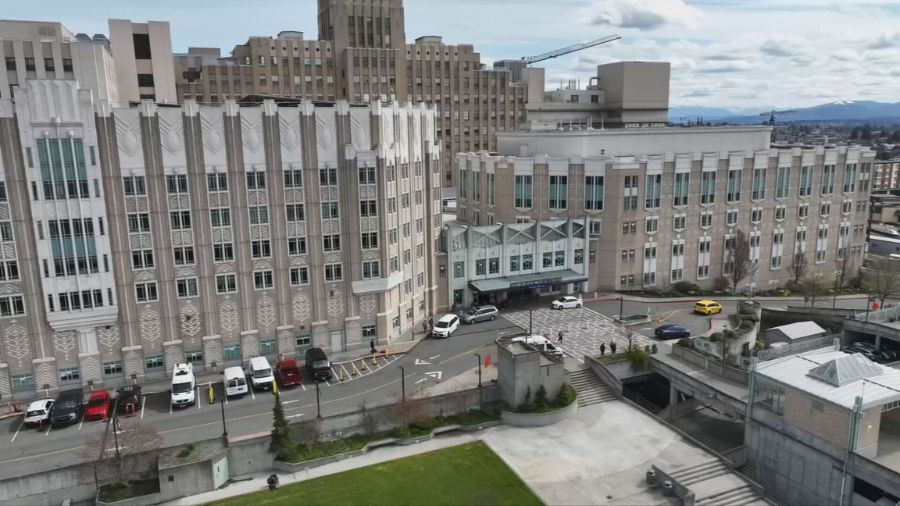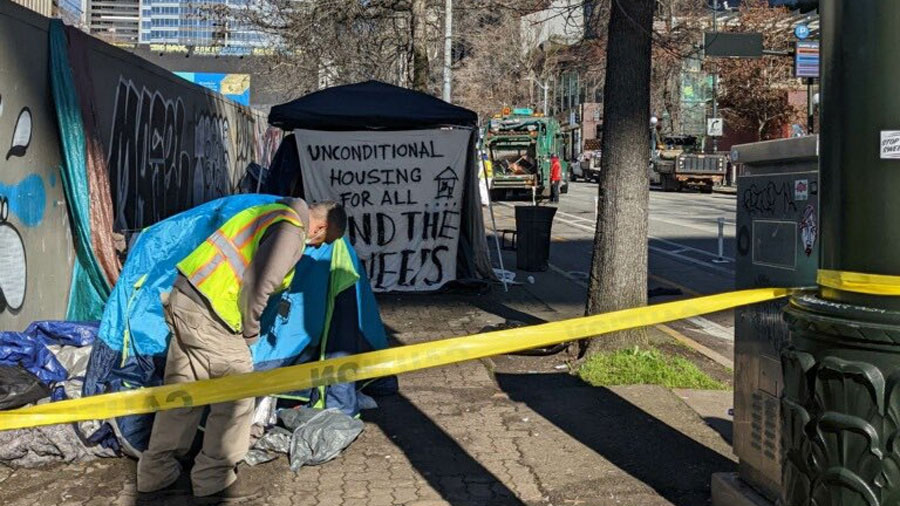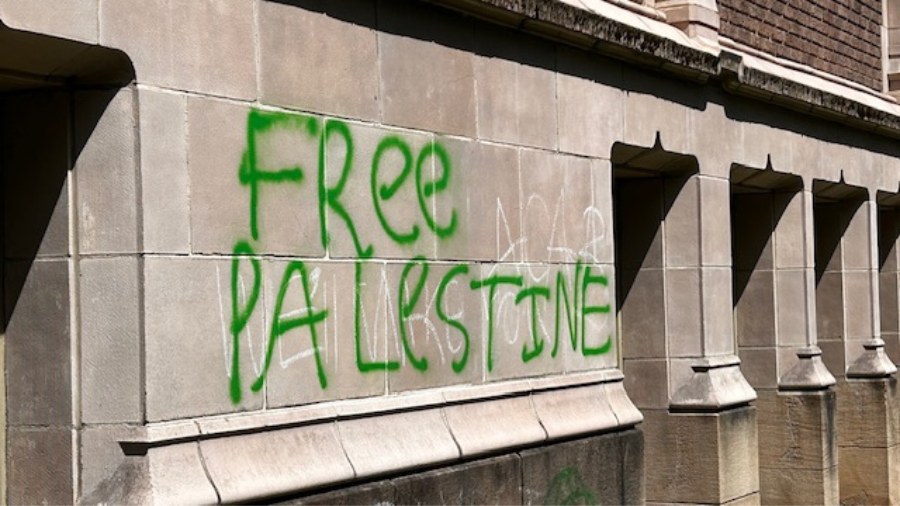Inslee signs natural gas bill into law, critics say it comes at expense of customers
Mar 29, 2024, 5:55 PM | Updated: Apr 1, 2024, 6:47 pm

A controversial bill concerning the future of natural gas in Washington is now law. (Photo: Wayne Parry, AP)
(Photo: Wayne Parry, AP)
A controversial bill concerning the future of natural gas in Washington is now law. But the heated debate over how we warm our homes is far from over.
Gov. Jay Inslee signed Engrossed Substitute House Bill 1589 (ESHB 1589) Thursday afternoon. He did so despite the growing calls for a veto, including from progressive and environmental groups. Those critics say the new law’s final language primarily benefits Puget Sound Energy (PSE) — at the expense of customers.
The natural gas bill was arguably the most controversial to be approved during the 2024 legislative session. After failing to pass last year, a significantly altered version barely made it through the state House this time. And that came only after House Speaker Laurie Jinkins, D-Tacoma, left the final roll call vote open until she could convince enough members of her own party to vote “yes.” Every Republican opposed it.
Because of the bill’s emergency clause, it takes effect immediately. Those against it say that means ratepayers are about to get hit — hard.
What the law does — and doesn’t do — for natural gas customers
At its core, the new law speeds up PSE’s move away from natural gas. Under ESHB 1589, the company will present plans for a phaseout of natural gas to the state Utilities and Transportation Commission (UTC) by 2027. As PSE puts it, “It will help us, under the supervision of the UTC, thoughtfully plan for the electric and natural gas choices of our customers consistent with our state’s aggressive climate goals.”
The change is not optional for PSE, which serves more than 900,000 customers in six counties, making it the state’s largest gas distribution system. It also provides electricity to about 1.2 million customers. Because of Washington’s already-existing climate laws, companies like PSE are legally required to transition to clean energy sources, quickly. As it stands, PSE must generate 80% of its energy from renewable energy sources by 2030 and 100% by 2045.
How the company gets there, and how quickly, has now become a hotly debated question.
Natural gas bill sparks heated debate, multiple revisions
PSE is the one that requested the bill be brought forward during the legislative session, with the company’s attorneys helping to draft it. But the measure that ultimately passed is markedly different from the one introduced in January. The original bill, written by House lawmakers, included a provision that would prohibit new residential and small commercial natural gas services after June 30. That part was stripped out at the eleventh hour, as was a provision that would have eliminated PSE’s legal obligation to provide natural gas to existing customers — which has been state law since 1911.
“This bill creates the roadmap and tools for our state’s largest utility to get out of the fossil fuel business and achieve net zero emissions by 2050,” Inslee said as he signed it Thursday.
But critics say that’s not all it does. They argue this sets the stage for a total statewide natural gas ban and will drastically inflate utility rates for everyone, as homeowners and businesses will bear the cost of converting from gas to electricity. As evidence, they point to the bill’s own language, which states that by 2027 PSE must, “achieve all cost-effective electrification of end uses currently served by natural gas.”
Simply put — if PSE determines an appliance (like a gas-powered heat pump) is not effective, state utility commissioners can require PSE to move customers from natural gas to electricity, regardless of the obligation to serve.
Supporters of the bill, including a majority of Democrats in the state legislature, say ESHB 1589 is simply a planning tool for PSE. Rep. Beth Doglio, D-Olympia, the bill’s primary sponsor, said it helps guide the transition from natural gas as part of an overall plan to mitigate the effects of climate change.
Progressives say bill helps PSE, hurts customers
But even those on Inslee’s side of the aisle have expressed serious concerns about the parts of the legislation that stayed in. Multiple progressive organizations, including the Sierra Club, Washington State Budget and Policy Center, The Washington State Community Action Partnership (WSCAP) and Sightline Institute urged Inslee to veto part of the bill that allows for what’s termed “accelerated depreciation.”
“The amended version of the that passed in Washington’s 2024 legislative session is lopsided, with too many financial perks for PSE and too few financial solutions for managing the costs of the gas-to-clean-energy transition for consumers,” wrote Sightline Institute fellow and former Puget Sound Energy engineer, Laura Feinstein, in a blog post earlier this month.
Accelerated depreciation would let PSE speed up how quickly it’s passing the costs of natural gas infrastructure to customers, instead of spreading increases over multiple years as it has previously. WSCAP, which is in favor of decarbonization efforts, says the last-second changes to ESHB 1589 have turned it into a “poison pill” that helps PSE and hurts everyone else.
“This will lead to significant short-term rate increases which will disproportionately impact low and moderate-income households without corresponding commitments from the utility to retire gas infrastructure to meet climate targets and save customers money,” the group wrote in a public statement.
The legislation does offer some financial assistance to lower-income homeowners. But the money can’t be used to replace gas appliances or make other home modifications. Republicans, who have made no secret of their staunch disapproval of the bill, said it ultimately imposes enormous costs on customers in order to protect PSE from the financial consequences of bad energy policy.
“Customers will be responsible for replacing gas furnaces, water heaters, stoves and commercial and industrial equipment,” said Sen. Chris Gildon, R-Puyallup.
The Building Industry Association of Washington (BIAW) estimates PSE’s residential customers will face a cost of $7 billion to $10 billion converting to electricity, with average costs expected to be about $40,000 per home.
“Owners of older homes can expect much higher costs because of necessary upgrades to wiring, electrical panels and other equipment,” Gildon added.
Puget Sound Energy defends phase-out plan
PSE pointed to data showing natural gas energy use is declining, down 7% for residential and 3% for commercial customers in 2023, and forecasted a continued decline over the next five years. Electricity use, by contrast, is increasing and is forecasted to continue to rise.
“We know many consumers are choosing to electrify their homes and businesses and are taking advantage of state and federal incentives,” reads a PSE fact sheet issued the day the bill was signed into law. “PSE has dramatically expanded our low-income bill assistance programs and established a new bill discount rate for qualifying customers to protect them through this long transition.”
PSE spokesperson Melanie Coon sent a statement to KIRO Newsradio Monday evening about the bill’s signing, pointing out Inslee’s leadership.
“We appreciate the thoughtful leadership of Governor Inslee and the efforts of the state legislature to enact House Bill 1589 into law,” the statement reads. “This is a positive step in what will be a lengthy process of planning for the future energy choices of our electric and natural gas customers and meeting our state’s aggressive clean energy goals.”
The company did not provide details on any assistance for middle-income ratepayers. It also did not address potential impacts on renters, who could potentially absorb the costs of their landlords’ electrification efforts.
It appears customers will not be waiting long to see their utility costs rise. Even before this bill was signed into law, PSE presented a two-year rate hike plan to the UTC. The company said the price jump was necessary for maintaining essential utility services and ensuring the safe and reliable delivery of energy. Additionally, it would supposedly help PSE comply with what it called Washington’s “aggressive” environmental policies.
Under the proposal, the typical residential electricity customer would see a monthly increase of $7.84 starting in 2025 and an additional $11.20 in 2026. The typical natural gas customer would see a $13.96 increase in 2025 and $1.51 in 2026, according to the utility.
Over two years, that would amount to around a 17% increase for residential electric customers. For residential gas customers, it goes up a total of 20%. However, those numbers are not final, and the commission may choose to set and structure the rates differently.
More changes ahead for Washington natural gas policy
The so-called “PSE bill” has gotten the lion’s share of attention in the energy debate. But other measures spearheaded by state officials are quietly forcing through some of the same edicts that were taken out of this legislation. The Washington State Building Code Council (SBCC) approved new building and energy codes last year. Which, after a months-long delay, went into effect Mar. 15. The codes require new homes and buildings to achieve the same total energy performance as buildings built with electric heat pumps, while allowing builders flexibility to choose appliances.
But those against it say it’s a subtle way to effectively ban natural gas in new construction. BIAW and other homebuilding and gas industry representatives are currently engaged in an ongoing legal battle to repeal the codes – arguing the council overstepped its authority in an attempt to “implement Governor Inslee’s environmental agenda through building and energy codes.”
Additionally, Republicans have argued that this entire debate could be a moot point if Washington voters choose to repeal the Climate Commitment Act (CCA) through an initiative on the November ballot. However, a PSE spokesperson told KIRO Newsradio that even if the CCA goes away, other state climate laws, like the Clean Energy Transformation Act (CETA) will continue to dictate how the utility company shapes its future energy policies.
You can read more of Kate Stone’s stories here. Follow Kate on X, formerly known as Twitter, or email her here.













